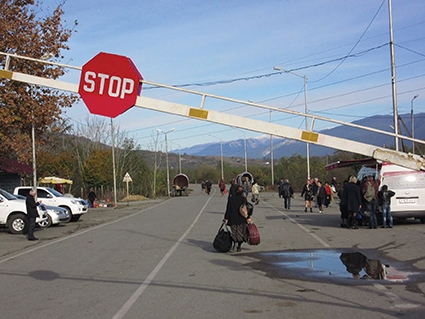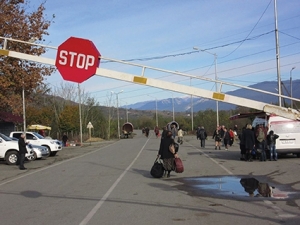De-facto Abkhazian Officials Close Two Crossing Points on Occupation Line
The government of the breakaway region Abkhazia closed two crossing points along the administrative boundary line (ABL) on March 5.
Before this decision, three crossing-points along the occupation line were accessible: Enguri Bridge, Nabakevi-Khurcha and Otobaia-Orsantia. Now, following a decision by the de-facto Abkhazian authorities, only Enguri Bridge will remain open for locals to cross the occupation line.
Georgia’s Ministry of Foreign Affairs (MFA) condemned the closure, highlighting that last year the representatives of the regime also closed the crossing points in the villages of Tagiloni and Lekukhona.
“This decision grossly violates fundamental rights to freedom of movement, privacy and family life, access to education and healthcare for the local population, and serves for isolation of the occupied Abkhazia region from the rest of the world,” the statement of the MFA reads.
The ministry says that closing crossing points along the occupation line will aggravate the already difficult humanitarian situation in the Abkhazia region, especially the lives of vulnerable groups, such as the elderly, people in need of medical care or medical evacuation and schoolchildren, further provoking destabilization of the situation on the ground.
Moreover, the MFA states that despite clear-cut appeals from the international community, the regime in Sokhumi made the decision to continue its policy and to impede the peaceful conflict resolution efforts offered by the Georgian government.
“The Ministry of Foreign Affairs calls upon the Russian Federation to refrain from provocative actions against Georgia, and to respect the fundamental principles of international law, as well as commitments taken under the EU-mediated 12 August 2008 Ceasefire Agreement, in order to make a responsible approach to the prevention of escalation of tensions on the ground,” the statement reads.
The ministry also appealed to the international community to duly assess the tendency to close the crossing points and isolate the occupied regions; the referendum will be held on 9 April in the Tskhinvali region, and take effective measures in regard to Russia’s illegal steps undermining the sovereignty and territorial integrity of Georgia.
Ketevan Tsikhelashvili, Georgia’s Minister of Reconciliation and Civil Equality also criticized the closure of crossing points.
“Around 1000 people use the crossing points every day and the closure of two more points violates the fundamental rights of local residents,” Tsikhelashvili says. “This includes the right to free movement, private and family life, education and healthcare. The de-facto regime’s argument that the crossing points were closed for 'enhanced security measures' is groundless. These points are used by peaceful populations for domestic reasons,” she added.
The minister called on all parties involved in the decision to realize the gravity of the action and take steps toward simplifying movement in the affected region.
Thea Morrison












